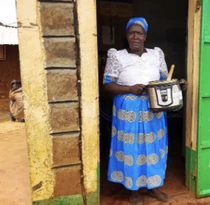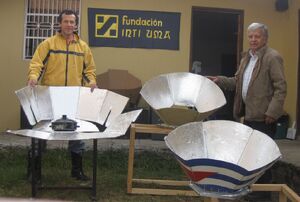Ben Hedrick (talk | contribs) (added googlelink) |
m (→Possible [[funders]] for solar cooking projects in Ecuador: Changing external links.) |
||
| (20 intermediate revisions by 6 users not shown) | |||
| Line 1: | Line 1: | ||
| − | {{GoogleTranslateLinks}} |
+ | {{GoogleTranslateLinks}} |
| + | |||
| + | {{Updated|2|20|13}} |
||
| + | [[File:Fabiola_Cuvi3.jpg|thumb|250px|[[IECAIM]] solar cooking workshop]] |
||
| + | ==Events== |
||
| + | {{EcuadorEvents}} |
||
| + | {{CalendarAndPastEvents}} |
||
| + | |||
==News and Recent Developments== |
==News and Recent Developments== |
||
| + | [[File:Inti_Uma_November_2012.jpg|right|300px]] |
||
| + | *'''November 2012:''' At the invitation of [[Solar Cookers International]], [[Rodrigo Carpio]] of [[Fundación Inti Uma Ecuador]] built a "[[Minimum Solar Box Cooker]]" and exhibited it for the first time on Earth Day in 1990. Thus began the "Green Decade" (1990-2000) in Ecuador. We took the path of the sun and created the foundation INTI UMA, Quechua words that evoke, for our actions, the illumination of the mind in the warmth of the heart. We attended the International Congress of solar cookers SCI sponsored and organized in Cuenca, Ecuador and the Second Conference for Latin America and the Caribbean in 1997. We have conducted 230 rural and community workshops to teach the making and using of solar cookers. We have taught students at the College Benigno Malo (approx. 5,000) and the University of Cuenca. We investigated appropriate designs equatorial sun oven Inti Churi (Son of the Sun), fruits and food dehydrator; Three in one hub - paraboloid - furnace, "[[Sunflower]]" hub; Oven José Sol, multi reflector, and recreation of the Solar [[CooKit]]. However, we have not developed self-sustaining projects due to lack of funding. In Ecuador LPG is subsidized, masking the real cost of cooking gas. The current petroleum bonanza in our country results in the inability of our government to understand the urgent need to replace fossil fuels with renewable energy. |
||
==The History of Solar Cooking in Ecuador== |
==The History of Solar Cooking in Ecuador== |
||
| Line 17: | Line 26: | ||
were used to publicize the efforts and results of this work. |
were used to publicize the efforts and results of this work. |
||
| + | [[File:Fabiola_Cuvi2.jpg|thumb|250px|[[IECAIM]] solar cooking workshop]] |
||
After the pilot efforts proved to be very successful, promotional activity was |
After the pilot efforts proved to be very successful, promotional activity was |
||
carried out in many places where women and girls congregate, schools, factories, and |
carried out in many places where women and girls congregate, schools, factories, and |
||
| Line 30: | Line 40: | ||
*[[Solar cooker dissemination and cultural variables]] |
*[[Solar cooker dissemination and cultural variables]] |
||
| − | == |
+ | ==Resources== |
| + | ===Possible [[funders]] for solar cooking projects in Ecuador=== |
||
| + | *[http://www.kiva.org/partners/137 Fundación ESPOIR] |
||
| + | *[http://www.kiva.org/partners/147 Fundacion D-MIRO Mision Alianza] |
||
| + | |||
===Reports=== |
===Reports=== |
||
| + | *'''July 2006:''' [http://images2.wikia.nocookie.net/solarcooking/images/7/7d/Granada06_Fabiola_Cuvi.pdf New and Renewable Sources of Energy for Rural Women Decreases Rural Woman's Demand for Fuelwood and Initiated the Solar Cooking Industry] - ''Dr. [[Fabiola Cuvi]]'' |
||
| − | *'''July 2006:''' [[Media:Granada06_rodrigo_carpio.pdf| |
+ | *'''July 2006:''' [[Media:Granada06_rodrigo_carpio.pdf|Cookers for the Ecuatorian Sun]] - ''Rodrigo Carpio'' |
===Articles in the media=== |
===Articles in the media=== |
||
===Web pages=== |
===Web pages=== |
||
| − | * |
+ | * [http://solarcooking.org/espanol/solarcooking-faq-span.htm Preguntas Frecuentes de la Cocción Solar] |
| + | [[Image:IECAIM_September_2008.jpg|thumb|250px|left|IECAIM solar cooking workshop]] |
||
| − | |||
| + | {{clr}} |
||
| − | ==Contacts== |
||
| + | ===Grupo de discusión Facebook=== |
||
| − | *A complete list of NGOs and individuals working in {{PAGENAME}} is available in the [http://solarcooking.org/directory.htm#{{PAGENAME}} International Directory of Solar Cooking Promotors]. |
||
| + | * [http://www.facebook.com/groups/251858061602590/ Cocinillas Solares sin Fronteras] |
||
| − | |||
| − | ===NGOs based in or working in the {{PAGENAME}}=== |
||
| − | <DynamicPagelist> |
||
| − | category=NGOs |
||
| − | category={{PAGENAME}} |
||
| − | ordermethod=title |
||
| − | suppresserrors=true |
||
| − | </DynamicPagelist> |
||
| − | ===Individuals=== |
||
| − | <DynamicPagelist> |
||
| − | category=Who's who in the solar cooking movement |
||
| − | category={{PAGENAME}} |
||
| − | ordermethod=title |
||
| − | suppresserrors=true |
||
| − | </DynamicPagelist> |
||
| − | ===Manufacturers and vendors=== |
||
| − | <DynamicPagelist> |
||
| − | category=Manufacturers and vendors |
||
| − | category={{PAGENAME}} |
||
| − | ordermethod=title |
||
| − | suppresserrors=true |
||
| − | </DynamicPagelist> |
||
| − | |||
| − | ==See Also== |
||
| − | *[[:Category:{{PAGENAME}}|Click here for the complete list of Solar Cooking Wiki articles related to {{PAGENAME}}]] |
||
| − | |||
| + | {{CountryContacts}} |
||
| − | [[Category:{{PAGENAME}}]][[Category:South America]][[Category:Americas]] |
||
| − | [[Category: |
+ | [[Category:South America]] |
| + | [[Category:Americas]] |
||
| + | [[Category:Countries]] |
||
[[Category:Spanish-speaking countries]] |
[[Category:Spanish-speaking countries]] |
||
Revision as of 00:01, 5 November 2014
|
Last edited: 20 February 2013
|
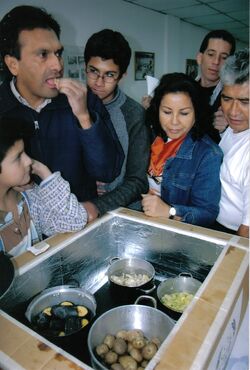
IECAIM solar cooking workshop
Events
Featured international events
- 4-6 June 2024 (Bridgetown, Barbados): Sustainable Energy for All Global Forum - The event will be co-hosted by Sustainable Energy for All (SEforALL) and the government of Barbados. It is a platform for government, business and finance leaders, entrepreneurs, and youth and community representatives from around the world to come together to broker new partnerships, spur new investment, and address challenges at the nexus of energy, climate, and development. More information...
Online events
- NEW: Thursday, 18 April 2024 (2:30pm-3:15pm EDT), (Washington, D.C., USA): ESMAP Spring Meetings Knowledge Café: Clean Cooking at the Heart of Energy Access - Join ESMAP for this exciting knowledge-sharing opportunity, which will showcase the role of clean cooking as a key part of energy access and energy transition. Presentations by René van Hell, Director of Inclusive Growth, Ministry of Foreign Affair, Netherlands, Dr. Kandeh Yumkella Chairman, Presidential Initiative on Climate, Renewable Energy and Food Security, Sierra Leone, and Chandrasekar Govindarajalu, Practice Manager, ESMAP, World Bank. In-person attendance at World Bank Atrium, MC Front Lobby is for Spring Meetings registrants only. However, you can watch the event online
Requests for proposal
- Decentralized Renewable Energy Solutions utilizing Solar and Bio-Energy - Sustainable Energy Technologies and Assessments of ScienceDirect, is requesting guest-author submissions. The special issue, VSI: DRES is devoted to publishing research articles reporting the innovative designs and design interventions in solar thermal and bio-energy for decentralized energy systems (DES). It includes i) new and novel designs of prototype or commercial devices and technologies, their development, modeling and simulations and experimental validation; ii) innovations for processes, techniques, utilization, and applications; iii) novel use of materials for improving efficiency, performance, techno-economic feasibility, and sustainability and iv) research findings addressing the socio-economic, health and safety impacts, and life cycle assessments leading to proposing novel devices for DES. The Deadline for submission is 31 July 2024. More submittal information...
- See also: Global Calendar of Events and past events in Ecuador
News and Recent Developments
- November 2012: At the invitation of Solar Cookers International, Rodrigo Carpio of Fundación Inti Uma Ecuador built a "Minimum Solar Box Cooker" and exhibited it for the first time on Earth Day in 1990. Thus began the "Green Decade" (1990-2000) in Ecuador. We took the path of the sun and created the foundation INTI UMA, Quechua words that evoke, for our actions, the illumination of the mind in the warmth of the heart. We attended the International Congress of solar cookers SCI sponsored and organized in Cuenca, Ecuador and the Second Conference for Latin America and the Caribbean in 1997. We have conducted 230 rural and community workshops to teach the making and using of solar cookers. We have taught students at the College Benigno Malo (approx. 5,000) and the University of Cuenca. We investigated appropriate designs equatorial sun oven Inti Churi (Son of the Sun), fruits and food dehydrator; Three in one hub - paraboloid - furnace, "Sunflower" hub; Oven José Sol, multi reflector, and recreation of the Solar CooKit. However, we have not developed self-sustaining projects due to lack of funding. In Ecuador LPG is subsidized, masking the real cost of cooking gas. The current petroleum bonanza in our country results in the inability of our government to understand the urgent need to replace fossil fuels with renewable energy.
The History of Solar Cooking in Ecuador
In Ecuador, solar cooking has had support from the government, largely through the involvement of representatives of a semi-official unit known as IECAIM, or the Ecuadorian Research Institute for Women's Training. The group was organized to serve as a focal point for the country in connection with the work of the United Nations agency called the International Research and Training Institute for the Promotion of Women (INSTRAW), a specialized agency focused on the issues of women. One of its areas of interest was the use of new and renewable forms of energy, which encompassed solar cooking and solar drying of foods. IECAIM took up that challenge and has been the most active promoter of solar cooking in Ecuador, under the leadership of its Director, Fabiola Cuvi Ortiz. IECAIM has been active since 1986 in providing training courses for women on building and using solar cookers. Workrooms were established for meetings and training courses. Initially, 300 solar cookers were built, mostly women themselves, who were also trained in the new mode of cooking. Both newspapers and television media were used to publicize the efforts and results of this work.
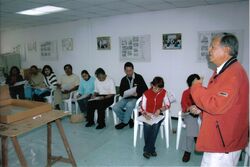
IECAIM solar cooking workshop
After the pilot efforts proved to be very successful, promotional activity was carried out in many places where women and girls congregate, schools, factories, and women's groups. In a situation of unrest (a border dispute with Peru), cookers were provided for the displaced families. In the course of this work, four small production industries have been started, building cookers to sell to others, with work done by women. In total, nearly 1,000 cookers have been disseminated in Ecuador. The Institute has also published two books, one on solar oven construction, and the other on cooking.
[Information for this section was taken originally from State of the Art of Solar Cooking by Dr. Barbara Knudson]
Climate, Culture, and Special Considerations
Resources
Possible funders for solar cooking projects in Ecuador
Reports
- July 2006: New and Renewable Sources of Energy for Rural Women Decreases Rural Woman's Demand for Fuelwood and Initiated the Solar Cooking Industry - Dr. Fabiola Cuvi
- July 2006: Cookers for the Ecuatorian Sun - Rodrigo Carpio
Articles in the media
Web pages
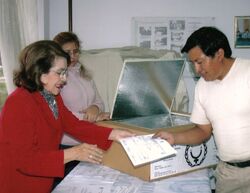
IECAIM solar cooking workshop
Grupo de discusión Facebook
Contacts
The entities listed below are either based in Ecuador, or have established solar cooking projects there:
SCI Associates
- Main article: Solar Cookers International Association


